

Coronavirus economic impact: Australia could be among world's hardest hit nations. Coronavirus impact to be felt in Australia as government braces for downturn in economic growth. The Australian government is bracing itself for a downturn in economic growth, after revealing the impact of coronavirus on the economy will be worse than the black summer of bushfires.
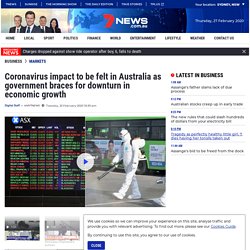
Australian unemployment shot up to 5.3% in January, setting the stage for another interest rate cut from the RBA. The Reserve Bank of Australia (RBA) may be considering cutting the official interest rate from 0.75% after unemployment rose quicker than expected.While creating 13,500 more net jobs in January, the unemployment rate jumped from 5.1% to 5.3%.
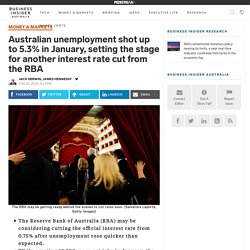
The market appears to be pricing in an April cut as a result, although there is a chance the RBA could cut at its next rates meeting in March. 'Jaw-dropping': Unemployment hits gloomy high, putting pressure on RBA. Australia’s unemployment rate has risen slightly to 5.3 per cent in official figures for January – with economists expecting it to keep rising.
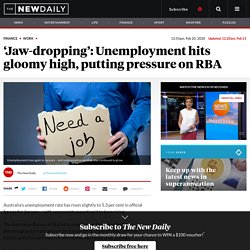
The Australian Bureau of Statistics reported on Thursday the 0.2 percentage point rise came on the back of 29,000 jobs created over the month, with the participation rate remaining steady at 66 per cent. But it noted the monthly growth in jobs was below the 20-year average. Full-time employment increased by 46,200 and part-time employment decreased by 32,700, while unemployment increased by 31,000. Wage growth, economic growth and unemployment stagnate in year of low expectations. Analysis Posted 27 Jan 2020, 8:30pmMon 27 Jan 2020, 8:30pm This year is shaping up as a dismal year for the economy, with no progress on many of the key measures that matter for Australians.
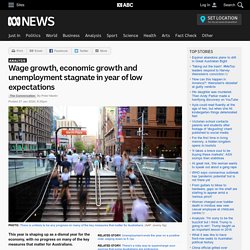
Unemployment will stay above 5 per cent and probably rise rather than fall. Economic growth will continue to have a "1" in front of it, instead of the "2" or "3" that used to be common, and living standards will grow more slowly. Wage growth, forecast in the budget to climb to 3 per cent, will instead remain stuck near 2.2 per cent, where it has been for half a decade. Those are the central forecasts of a panel of 24 leading economists from 15 universities in six states assembled by The Conversation to review the year ahead, a year they expect to be marked by only one more interest rate cut, more modest growth in house prices, and a return to slower growth in the share market.
Wages growth flatlines as Australian economy stalls. Wages growth has softened in the December quarter, expanding by just 0.5 per cent – the same as in the September quarter.
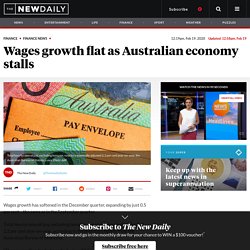
Total hourly rates of pay, excluding bonuses, rose by a seasonally adjusted 2.2 per cent year-on-year, according to Wednesday’s figures from the Australian Bureau of Statistics. “The seasonally adjusted quarterly rise of 0.5 per cent extended the period of moderate growth observed throughout 2019, and was influenced by the relative stability of the labour under-utilisation rate,” ABS chief economist Bruce Hockman said.
For the first time since 2012, private sector wages grew at a faster rate than the public sector (0.5 compared to 0.4 per cent), in original terms. Over the 12 months to the December quarter, both private and public sector wages rose 2.2 per cent. House prices, wage growth, unemployment: 2020 a year of low expectations. Photo by Jeremy Bishop on Unsplash 2020 is looking like a pretty ordinary year for the economy, if some of Australia's leading economists are to be believed.
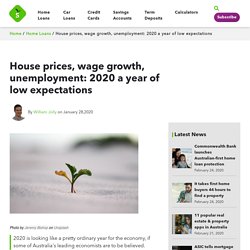
The Conversation's survey of 24 economists from 15 universities revealed many expect little progress on key measures that matter for Australians, such as unemployment, wage growth, house prices and living standards. Download. A look back at the Aussie retailers which have collapsed or gone into administration over the past few years. 161 shops gone in weeks: Why are Australian retail stores collapsing? The brutal 2020 retail bloodbath has well and truly begun, with 161 popular Australian bricks-and-mortar stores already earmarked for closure just one fortnight into the new year.
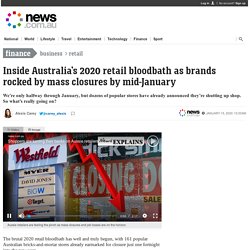
It started early on January 7 when it was revealed department store Harris Scarfe was set to shut 21 stores across five states over the course of just one month after the retailer was placed in receivership in December. Just days later, McWilliam’s Wines – the country’s sixth-largest wine company that has been run by the same family for more than 140 years – announced it had also appointed voluntary administrators. Then it was popular video game chain EB Games’ turn, with the business confirming it was closing at least 19 stores across the country within weeks, while fashion chain Bardot is also planning to shutter 58 stores across the nation by March.
Retail slumps to 'weakest' level since 1990s recession as tax cuts fail to stimulate consumer spending. Updated 4 Nov 2019, 12:49pmMon 4 Nov 2019, 12:49pm Consumers are still cutting back on spending as tax cuts and successive interest rate cuts have (so far) failed to stimulate Australia's retail sector.
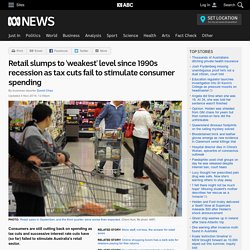
Key points: Retail spending for the month (+0.2 per cent) and quarter (-0.1 per cent) was worse than expectedThere is no evidence the RBA's interest rate cuts and Government's tax cuts have had much effectConsumer spending accounts for almost two-thirds of Australia's economic activity Retail spending was significantly worse than expected, according to the latest Bureau of Statistics figures. Retail Forecasts - November 2019: Little Christmas cheer but some promise in 2020. Source: ABS Cat 8501.0, Deloitte Access Economics Deloitte Access Economics partner and Retail Forecasts principal author, David Rumbens, said: “Retail sales look to be ending 2019 on a relatively soft note as consumers face increasing budget pressures.
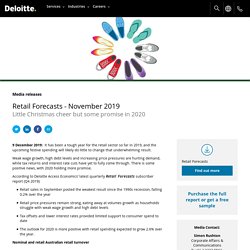
“Stagnating wage growth and weak house prices have limited consumer willingness to spend, while tax offsets and interest rate cuts have yet to translate to sales. And with retail prices increasing, spending volumes have taken the hit posting the weakest growth since the 1990s recession. The cost of drought - and it's just going to grow. In the 2007-08 financial year alone, more than $1.5 billion was promised in direct assistance to farmers and their surrounding communities.
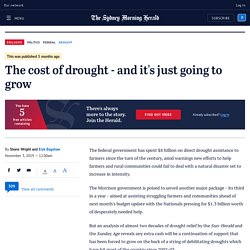
The following year another $1.1 billion was needed. Related Article. What Effect Will Drought Have On the Economy. The drought currently affecting New South Wales and parts of Victoria and Queensland – labelled by some as the worst in living memory – could wipe $12 billion from Australia’s GDP, according to a recent Commonwealth Bank of Australia report. The CBA economic briefing says that the drought, which so far has seen 100 per cent of NSW and more than half of Queensland drought-declared, could cut GDP growth by between 0.5 per cent and 0.75 across 2018-19, or as much as $12.5 billion.
ROSS GITTINS: Women are making themselves at home in the workforce. In the world of paid work, women still have a lot to complain about: unequal pay and promotion, still-inadequate childcare, and a tax and benefit system that discourages “secondary earners” from working more. All true. But don’t let this conceal from your notice the success women are having at flooding into the long male-dominated workforce and slowly reshaping it to their needs.
In my never-humble opinion, for as long as girls continue making themselves better educated than boys, it’s only a matter of time before women are calling the shots. Reserve Bank deputy governor Dr Guy Debelle highlighted women’s growing role in the labour market in a speech he gave last week. ROSS GITTINS: Sorry, the economy can't grow much without higher wages. I usually pooh-pooh all alleged recessions that have to be qualified with an adjective. With recessions, it’s the whole economy or nothing. Gross Domestic Product not the ultimate economic growth measure. What GDP measures can be described in several ways. Holden car brand, maker of Commodore and Barina, axed across Australia and New Zealand. Edwards et al 2019 Australian Journal of Social Issues. Climate Change and Bushfires. Retail insights edition 9.
Government sets up concessional loan scheme for drought-hit small businesses. Drought and rural support - Department of Agriculture.